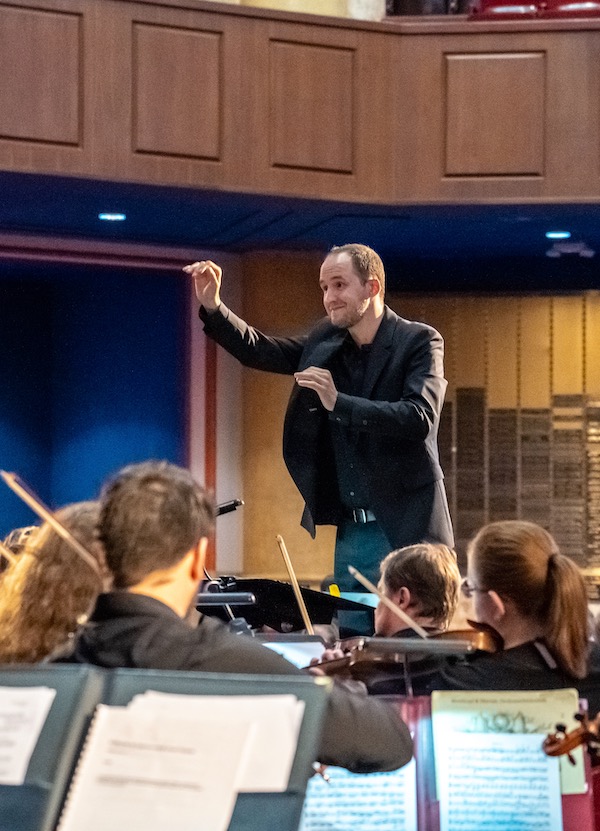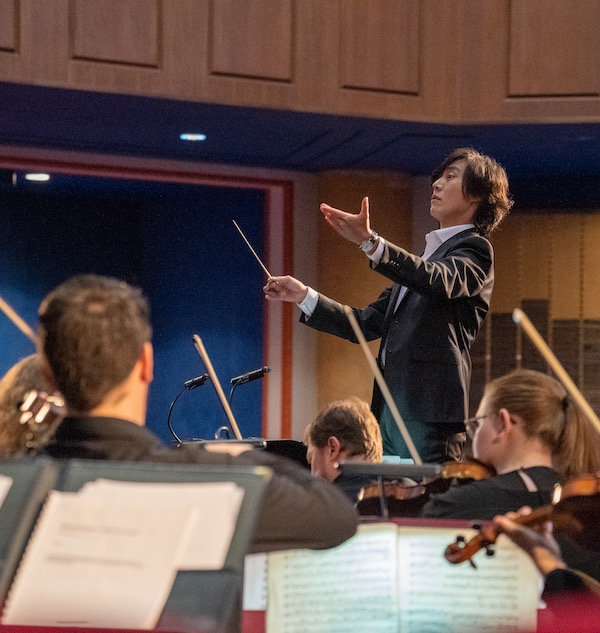Young conductors, orchestra show impressive abilities at Miami Beach Music Festival

The rechristened Miami Beach Classical Music Festival is offering a truncated summer season as the pandemic and its attendant restrictions slowly ease. All concert and operatic events are free this year.
A fairly large audience turned out Sunday afternoon at Temple Emanu-El for a concert by the festival’s student orchestra that showcased ten young conductors from the event’s conducting workshop.
The domed sanctuary of the venerable Washington Avenue landmark proved a resonant acoustical setting for the young players. Individual details came through with clarity and the ensemble blended felicitously without blaring harshness.
The afternoon’s biggest surprise may have been the high quality of the playing, both in terms of the corporate ensemble effort and the first chair solos. This was not quite the New World Symphony but the level of playing was far above most college or youth orchestras.
It is tricky to judge aspiring conductors based on a performance of one work or, as in the case of this concert, individual movements of two larger scores. Still some general impressions of the conductors’ technique, rapport and chemistry with the musicians and grasp of the music at hand were possible.
All of the youthful podium directors made a fine showing and, with continued study and artistic maturity, could make a contribution to the professional concert and opera scene. Four stood out as talents to watch in terms of their musical command and communicative skills.
Joe Lerangis had the unenviable task of being first up in the podium parade with a performance of Rossini’s Overture to L’Italiana in Algeri but he was more than up to the task. Lerangis’s purposeful gestures avoided flash and he elicited taut, crisp playing. Strings exhibited unanimity and precision and the oboe solos were well articulated. Lerangis’s grasp of Italian opera buffa style was fully evident, the Rossini crescendo built skillfully.
A welcome revival of A Short Piece for Orchestra by Julia Perry (1924-1979) proved rewarding. This African-American composer was better known during her lifetime as a conductor (in Europe) and pedagogue, including a teaching position at A&M University in Tallahassee. Her composition teachers included Nadia Boulanger and Luigi Dallapiccola.
Perry’s eight-minute essay alternates between terse and bustling fragments and long-limbed lyrical episodes. This work could make a fine concert opener in the Barber-William Schuman mode. The scores exhibit a distinctive voice and more of Perry’s scores need to be researched and performed. Julian Gau was a dynamic force on the podium. Charismatic and clearly in charge, Gau brought out the tension and darkness that runs through Perry’s score.
Manuel de Falla’s El Amor Brujo abounds in orchestral color and Spanish dance rhythms. Three conductors divided up the ballet score, and the orchestra ‘s execution was remarkably secure and transparent.
“The Ritual Fire Dance” is this opus’s hit tune and Jaco Wong drew edge-of-the-seat playing that was fiery indeed. A plethora of color and rhythmic drive were matched by delicate shading and a varied dynamic range. Xiao Geng achieved the most lustrous string sonority of the afternoon in the dance work’s concluding pages. Her baton technique was polished with tempo and phrasing beautifully calibrated. Soren Nyhus conducted the score’s opening sections in a careful, deliberate manner with fine gradations of volume. Mabel Ledo was the gutsy mezzo-soprano soloist, singing the three solos with flamenco intensity.
Bennett Astrove, with a more flamboyant style, set a leisurely tempo for Debussy’s Prélude à l’après-midi d’un faun. The intimately scaled reading was more like an orchestral vocalise. Excellent solo flute, oboe and harps emerged vividly through the impressionistic texture.
Four conductors each conducted a movement of Mozart’s Symphony No. 40 in G minor yet the orchestra’s solid performance resulted in a surprisingly unified interpretation. Oliver Chan’s astute cuing and moderate tempo emphasized the drama beneath the finely chiseled melodies of the openinig Molto allegro. Cheuk Nok Francis Ku led a stylish and fluent traversal of the Andante, with wind writing well balanced. Jéssica Evelyn Papi Silva’s forward thrust in the Menuetto suggested period-performance practice. The difficult horn writing was rendered with spot-on accuracy. Dongyul Lee, adopting more minimalist gestures, directed a lively Allegro assai finale that was fast without sounding rushed.
Brandon Flores, a seventeen-year-old tenor from the festival’s high school vocal program, soloed in “Amor, vida de mi vida” from the zarzuela Maravilla by Federico Moreno Torroba. (Flores was scheduled to sing at the festival’s al fresco 4th of July concerts which were cancelled due to the Surfside condo tragedy.) Flores has real throb in his voice and a strong lower range, talent that can be further developed. He also understood that this music should not sound too operatic.
Veteran conductor Mark Gibson, a faculty member at the University of Cincinnati College-Conservatory of Music, led an expert accompaniment. Gibson is director of the festival’s conducting program. His pedagogical experience (and command of symphonic and operatic repertoire) was clearly evident in the professionalism of all of the afternoon’s podium aspirants.
The Miami Beach Classical Music Festival presents Benjamin Britten’s Albert Herring 7:30 p.m. Thursday and Saturday at the Faena Forum, 3301 Collins Avenue in Miami Beach. The performances are free. miamimusicfestival.com
Posted in Uncategorized
Leave a Comment
Mon Jul 12, 2021
at 12:24 pm
No Comments







